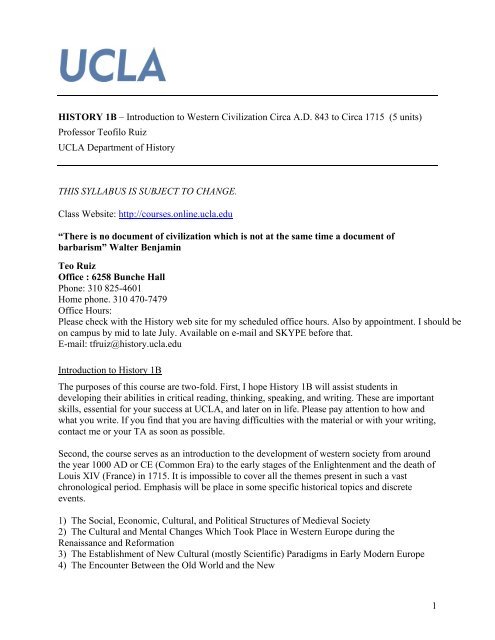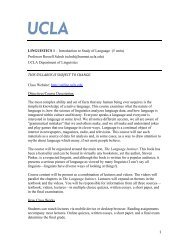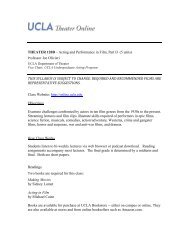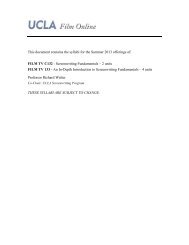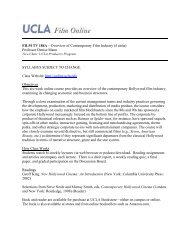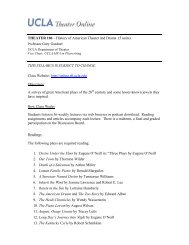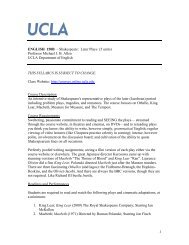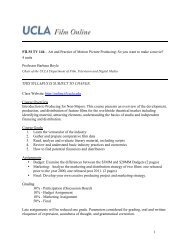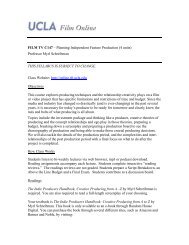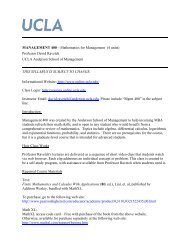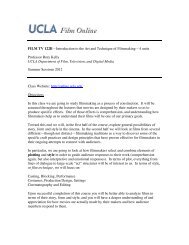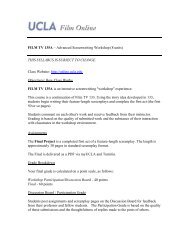HIST 1B Syllabus - UCLA Summer Sessions Online Courses
HIST 1B Syllabus - UCLA Summer Sessions Online Courses
HIST 1B Syllabus - UCLA Summer Sessions Online Courses
You also want an ePaper? Increase the reach of your titles
YUMPU automatically turns print PDFs into web optimized ePapers that Google loves.
<strong>HIST</strong>ORY <strong>1B</strong> – Introduction to Western Civilization Circa A.D. 843 to Circa 1715 (5 units)<br />
Professor Teofilo Ruiz<br />
<strong>UCLA</strong> Department of History<br />
THIS SYLLABUS IS SUBJECT TO CHANGE.<br />
Class Website: http://courses.online.ucla.edu<br />
“There is no document of civilization which is not at the same time a document of<br />
barbarism” Walter Benjamin<br />
Teo Ruiz<br />
Office : 6258 Bunche Hall<br />
Phone: 310 825-4601<br />
Home phone. 310 470-7479<br />
Office Hours:<br />
Please check with the History web site for my scheduled office hours. Also by appointment. I should be<br />
on campus by mid to late July. Available on e-mail and SKYPE before that.<br />
E-mail: tfruiz@history.ucla.edu<br />
Introduction to History <strong>1B</strong><br />
The purposes of this course are two-fold. First, I hope History <strong>1B</strong> will assist students in<br />
developing their abilities in critical reading, thinking, speaking, and writing. These are important<br />
skills, essential for your success at <strong>UCLA</strong>, and later on in life. Please pay attention to how and<br />
what you write. If you find that you are having difficulties with the material or with your writing,<br />
contact me or your TA as soon as possible.<br />
Second, the course serves as an introduction to the development of western society from around<br />
the year 1000 AD or CE (Common Era) to the early stages of the Enlightenment and the death of<br />
Louis XIV (France) in 1715. It is impossible to cover all the themes present in such a vast<br />
chronological period. Emphasis will be place in some specific historical topics and discrete<br />
events.<br />
1) The Social, Economic, Cultural, and Political Structures of Medieval Society<br />
2) The Cultural and Mental Changes Which Took Place in Western Europe during the<br />
Renaissance and Reformation<br />
3) The Establishment of New Cultural (mostly Scientific) Paradigms in Early Modern Europe<br />
4) The Encounter Between the Old World and the New<br />
1
PLEASE NOTE: I am interested in change over time, and your readings, online discussion, and<br />
writing should be placed within the context of specific issues:<br />
1) Cultural Borrowing and Cultural Transmissions<br />
2) The Relationship Between “High” and “Popular” Culture<br />
3) The Individual, the Community, and the State<br />
4) The Place and Role of Women in Western Society<br />
5) Religion, the Individual, and the World to Come<br />
6) Concepts and Articulations of Power<br />
Responsibilities and Assignments<br />
IN ORDER TO DO WELL IN THIS CLASS, YOU MUST FOLLOW THE<br />
INSTRUCTIONS OF YOUR TA, POST COMMENTS AND QUESTIONS AS<br />
INDICATED, AND BE IN TOUCH WITH YOUR TA OR WITH ME. YOU WILL NOT<br />
DO WELL IN THE CLASS IF YOU LIMIT YOURSELF TO THE ESSAYS AND FINAL<br />
PAPER. WEEKLY POSTINGS, ON-LINE DISCUSSIONS, AND ENGAGEMENT WITH<br />
THE CLASS ARE IMPORTANT WAYS IN WHICH WE ASSESS YOUR WORK. WE<br />
WISH YOU TO DO WELL AND WILL HELP YOU TO DO SO.<br />
1) Please follow the online lectures and be an active participant in your online discussion<br />
session. The lectures will provide background to the period under study and to the assigned<br />
readings. What I cover in the lectures will be different from the textbook coverage. The heart of<br />
the course will be in discussions of specific readings and interpretative issues.<br />
2) Reading assignments correspond to the discussion topics (see below). Students should<br />
complete the reading prior to watching the lectures. The course places particular emphasis on the<br />
assigned primary sources. Read them carefully and be prepared to discuss them intelligently on<br />
the discussion board. Books are available at the <strong>UCLA</strong> Bookstore—either on campus or online.<br />
They are also available at other stores and from online booksellers such as Amazon.com.<br />
Copies of the main readings are also available at the Undergraduate Library Reserve Room.<br />
3.) To make sure that you are not faced with a large amount of work at any moment during the<br />
quarter, we have divided the assignments into three different papers/take home essays. These<br />
assignments will allow you to keep up with the material and will allow us to review and help you<br />
improve your work throughout the term. Students will write a short paper (see below for paper<br />
requirements) at the end of the second week. The final will be a take home exam and questions<br />
will be discussed in detail.<br />
4.) The final exam will consist of essay questions. They will ask you to provide lengthier explication of<br />
a passage taken from one of the primary sources, as well as discuss some of the salient issues in the<br />
class. Please note that I have placed documents on the web site which will be material to be discussed in<br />
section and in the exams. I will be in touch with you via e-mail before the beginning of term.<br />
2
Essay/Paper Requirement<br />
THE FIRST ESSAY IS DUE AT THE END OF THE SECOND WEEK OF OUR TERM. IT<br />
SHOULD NOT EXCEED MORE THAN FOUR TYPED PAGES. IT SHOULD BE DOUBLE-<br />
SPACED WITH REASONABLE MARGINS. USE PAGE NUMBERS.<br />
TO FULFILL YOUR ESSAY/PAPER REQUIREMENT:<br />
I. You are expected to write two short essays/papers in this course. Writing is an important and<br />
necessary aspect of your general education. We are here to help you write a paper. Please begin thinking<br />
and planning what you are going to write. If you have a draft early in the term, we (I) will go over it<br />
with you and give you suggestions for changes. Your grade will improve as a result, as will your<br />
writing. YOU MUST RUN ASSIGNMENTS AND THE FINAL EXAM THROUGH TURN IT IN.<br />
ESSAY 1: ANSWER THE FOLLOWING QUESTIONS:<br />
You are a historian and the only extant source for the twelfth century is Gottfried von Strasburg, Tristan.<br />
What does this book tell you about the past? How can you reconstruct from this source (and from this<br />
source alone) aspects of medieval values and education, the role of women, the nature of honor,<br />
chivalry, etc.? What does this book tell you about the ideals and values of some segment of society? Be<br />
creative. Refer to the text.<br />
Your paper will be a critical reading and commentary on a primary source. Proper footnoting<br />
(University of Chicago Manual of Style), inclusion of a bibliography, and all other requirements for a<br />
formal paper are expected. If you do not know them, please see me or one of your TAs. This is<br />
important.<br />
COME TO HAVE FUN<br />
World Wide Web Use<br />
The course will be conducted on a password protected WWW site which contains lecture<br />
outlines, images, graphics, maps, terms, and timelines necessary for writing essays/papers and<br />
preparing for discussions, lectures, and exams. This Web site is intended only for the students in<br />
this course and is not available to the public.<br />
Grading<br />
The following percentages will determine your grade:<br />
Participation in your online discussion sections 30%<br />
Essay 1 20%<br />
Essay 2 20%<br />
Final Paper 30%<br />
3
Readings<br />
Required Textbook:<br />
-Hunt, Martin, Rosenwein, Po-Chia Hsia, and Smith, The Making of the West, vol. I (To<br />
1750), 4 th ed. Bedford-St. Martin’s. ISBN 978-0-312-67269-0. Please note that this book<br />
may also be purchased electronically for your Kindle or other e-reader.<br />
Primary Sources:<br />
- K. J. Lualdi, Sources of The Making of the West to 1715, vol. I Bedford.<br />
*Please note this book is free when purchased together with the text above (Hunt<br />
et al). In addition, there will be other primary sources available online.<br />
Other Texts:<br />
- G. von Strassburg, Tristan, (Penguin)<br />
- William Shakespeare, The Tempest (Penguin)<br />
4
Schedule of Talks and Readings<br />
WEEK 1<br />
Lecture 1: Introduction to the Course<br />
A) What is Culture?<br />
B) How to read culture?<br />
C) Why History? Setting up the agenda<br />
D) Problems in European Culture. In the Shadow of Plato<br />
E) Geography, Language, Sources. The Concept of Time<br />
F) Against Whiggish History<br />
G) History is Bunk<br />
Required Reading:<br />
Hunt et al, ch. 8: The Heirs of Rome, “Western Europe: A Medley<br />
of Kingdoms,” pp. 257-271.<br />
Excerpts from Benjamin and Geertz.<br />
Begin reading Tristan by G. von Strassburg<br />
Lecture 2: The Forging of Feudal Relations<br />
A) The World in the Year 1000<br />
B) Western Europe in the Year 1000. Towards a new Millennium. Fear and Hope<br />
C) The Ruins of the Carolingian Empire<br />
D) Magyars, Saracens, and Vikings<br />
E) The Feudal Revolution<br />
F) Inventing the Tripartite Society: Those who fight, those who work, those who pray<br />
Required Reading:<br />
Hunt et al, ch. 9: From Centralization to Fragmentation, “The<br />
Carolingian Empire,” pp. 287-297.<br />
Continue reading Tristan by G. von Strassburg<br />
Suggested Reading:<br />
Lualdi, ch. 9: From Centralization to Fragmentation, sel. 1: The<br />
Rule of Charlemagne, pp. 175-179.<br />
Lecture 3: The Structures of Everyday Life<br />
A) Lords and Peasants<br />
B) Serfdom<br />
C) Agrarian Life<br />
Required Reading:<br />
Hunt et al, ch. 9: From Centralization to Fragmentation, “After the<br />
Carolingians,” pp. 297-307.<br />
Lualdi, ch. 9: From Centralization to Fragmentation, sel. 6: The<br />
Faithful Vassal, pp. 190-192.<br />
Finish Tristan by G. von Strassburg<br />
5
WEEK 2<br />
Lecture 4: A Changing Landscape, A Changing Church<br />
A) Townsmen: The Rise of Cities (Stadt Lufte Macht Frei)<br />
B) Trade and bankers<br />
C) God’s Time and Merchants’ Time<br />
D) The Church in a Changing Time<br />
E) Monastic, Lay, and Papal Reform<br />
Required Reading:<br />
Hunt et al, ch. 10: Commercial Quickening and Religious Reform,<br />
“The Commercial Revolution,” pp. 311-319 and “Church Reform,”<br />
pp. 319-329.<br />
Lualdi, ch. 10: Commercial Quickening and Religious Reform, sel.<br />
1, Medieval Business, pp. 193-196.<br />
Le Goff article<br />
Lecture 5: The Civilization of the High Middle Ages<br />
A) Monastic, Lay, and Papal Reform (continued)<br />
B) Spiritual and Temporal in Western Christendom: Lay Investiture<br />
C) The libertas of the Church<br />
D) Preaching Crusades. The West Expands<br />
Required Reading:<br />
Hunt et al, ch. 10: Commercial Quickening and Religious Reform,<br />
“The Crusades,” pp. 329-335 and “The Revival of Monarchies,”<br />
pp. 335-341.<br />
Lecture 6: The Twelfth-Century Renaissance<br />
A) The Crusades Continued<br />
B) Poetry: Goliardic, Christian, Epic, Troubadour<br />
C) The Recovery of the Past. A Latin Renaissance<br />
D) Translations<br />
E) Courtly Love. Women in Western Society<br />
Lualdi, ch. 10: Commercial Quickening and Religious Reform,<br />
sel. 2: Sources of the Investiture Conflict, pp. 197-199; sel. 3:<br />
Calling the First Crusade, pp. 199-201; sel. 4, Arab Response to<br />
the First Crusade, pp. 201-206.<br />
Required Reading: Hunt et al, ch. 11: The Flowering of the Middle Ages, pp. 345-377<br />
(entire chapter).<br />
Lualdi, ch. 11: The Flowering of the Middle Ages, sel. 2, Scholarly<br />
Pursuits and Youthful Frolics, 215-220; sel. 3, Courtly Love,<br />
pp. 220-226.<br />
6
Assignment due: Short essay/paper by end of week<br />
WEEK 3<br />
Lecture 7: Culture and Society in the High Middle Ages<br />
A) Universities and the New Philosophy<br />
B) The Rebirth of Philosophy: Abelard and Heloise<br />
C) The Reception of Aristotle: Albert Magnus and Thomas Aquinas<br />
D) Radical Views (Averroism)<br />
Required Reading: Hunt et al, ch. 12: The Medieval Synthesis, “The Church’s Mission,”<br />
pp. 381-388 and “Reconciling This World and the Next,” pp. 388-<br />
396.<br />
Lualdi, ch. 11: The Flowering of the Middle Ages, sel. 1, New<br />
Learning, pp. 211-15.<br />
Lualdi, ch. 12: The Medieval Synthesis, sel. 1 Reconciling Faith and<br />
Reason, pp. 235-240.<br />
Lecture 8: Heresy and its Repercussions<br />
A) Romanesque and Gothic<br />
B) Heretics and Mystics<br />
C) Waldensians and Cathars<br />
E) Creating “Otherness”: The Birth of the Inquisition<br />
E) New Religiosity<br />
Required Reading: Lualdi, ch. 12: The Medieval Synthesis, sel. 2, A Female Mystic,<br />
pp. 240-243; sel. 3, Defining Outsiders, pp. 243-246.<br />
Lecture 9: An Urban Spirituality and the Emergence of Centralized Kingdoms<br />
A) St. Francis and St. Dominic: The Mendicants and The Transformation of Values<br />
(mentalité)<br />
B) The Fourth Lateran Council: The Closing of Frontiers<br />
C) Problems in State Building<br />
D) The Growth of Bureaucracies<br />
E) The King as Healer<br />
F) The King’s Two Bodies<br />
G) Pro Patria Mori<br />
H) Anagni<br />
I) Unsacred Kingship: Castile<br />
G) From Suzerainty to Sovereignty, from Feudal to the Nation<br />
Required Reading:<br />
Hunt et al, ch. 12: The Medieval Synthesis, “The Politics of<br />
Control,” pp. 396-406.<br />
7
Lualdi, ch. 11: The Flowering of the Middle Ages, sel. 4,<br />
Franciscan Piety, pp. 226-230.<br />
Lualdi, ch. 12: The Medieval Synthesis, sel. 5, The New Power,<br />
pp. 250-253.<br />
WEEK 4<br />
Lecture 10: Part 1: The Late Medieval Crisis: 1285 – 1400<br />
A) The Crisis of the Fourteenth Century: Malthusian Pressure or Structural Weaknesses?<br />
B) Famine<br />
C) War: The Social Impact of the Hundred Years War<br />
Lecture 10: Part 2: The Late Medieval Crisis (continued)<br />
A) The Hundred Years’ War (continued)<br />
B) Plague<br />
C) New Forms of Spirituality<br />
D) The Waning of the Middle Ages: Violence, Death, and the World to Come<br />
E) The Birth of New Aesthetics<br />
Required Reading:<br />
Hunt et al, ch. 13: Crisis and Renaissance, “Crisis: Disease, War,<br />
and Schism,” pp. 411-427.<br />
Lualdi, ch. 13: Crisis and Renaissance, sel. 1, Demographic<br />
Catastrophe, pp. 254-259; sel. 3, Satirizing the Church, pp. 262-<br />
266.<br />
Lecture 11: Peasant Risings, Royal Consolidation of Power, and Dante<br />
A) Revolution<br />
B) The Place of Italy<br />
C) The State as a Work of Art<br />
E) The Catholic Monarchs<br />
F) Dante: The Divine Comedy<br />
Required Reading:<br />
Hunt et al, ch. 13: Crisis and Renaissance, “Consolidating Power,”<br />
pp. 436-446.<br />
Lualdi, ch. 12: The Medieval Synthesis, sel. 4, Imagining Hell,<br />
pp. 246-250.<br />
Lualdi, ch. 13: Crisis and Renaissance, sel. 2, Crisis and Change,<br />
pp. 259-262; sel. 4, Preaching Reform, pp. 266-271.<br />
The Tempest by William Shakespeare<br />
8
Lecture 12: The Renaissance<br />
A) Painting and Humanism<br />
B) The Early Renaissance: Petrarch<br />
C) Humanism and Aesthetics<br />
D) The Secularization of Everyday Life<br />
1) Politics: Machiavelli<br />
2) Art: Botticelli<br />
3) Economics: proto-Capitalism<br />
Required Reading: Hunt et al, ch. 13: Crisis and Renaissance, “The Renaissance,” pp. 427-<br />
436.<br />
Assignment due: Short essay/paper by end of week<br />
Lualdi, ch. 13: Crisis and Renaissance, sel. 5, Extolling<br />
Humanism, pp. 271-274; sel. 6, Women’s Place in Renaissance<br />
Italy, pp. 275-277.<br />
WEEK 5<br />
Lecture 13: The Encounter of Two Worlds and European Expansion<br />
A) The Expansion of the West<br />
B) Spices, religion, and Power<br />
C) Iberia at the Dawn of Modernity: Portugal and Africa<br />
D) Technology and Seafaring<br />
E) 1492: The Expulsion of the Jews, Inquisition, and Columbus<br />
F) Spain in America<br />
G) The First Encounter in the Caribbean<br />
H) The Valley of Mexico<br />
I) Slavery<br />
J) Economics of Scale: American Silver and Inflation<br />
K) Capitalism<br />
Required Reading:<br />
Hunt et al, ch. 14, Global Encounters and the Shock of the<br />
Reformation, “The Discovery of New Worlds,” pp. 451-458.<br />
Lualdi, ch. 14: Global Encounters and the Shock of the<br />
Reformation, sel. 1, Worlds Collide, pp. 278-283; sel. 2,<br />
Illustrating a Native Perspective, pp. 283-284; sel. 3: Defending<br />
Native Humanity, pp. 284-287.<br />
9
Lecture 14: The Protestant Reformation and Religious Wars<br />
A) Luther and Calvin: The Protestant Reformation<br />
B) War and Religion<br />
C) The Catholic Reform: Trent<br />
D) A Divided Europe<br />
E) The Politics of Religious Warfare<br />
F) The Power of Kings. Towards a New Concept of the “State.”<br />
G) The Shock of the New. The New World. The New Christian Self<br />
Required Reading:<br />
Hunt et al, ch. 14, Global Encounters and the Shock of the<br />
Reformation, “The Protestant Reformation,” pp. 458-466 and<br />
“Reshaping Society through Religion,” pp. 466-472 and “Striving<br />
for Mastery,” pp. 472-479.<br />
Hunt et al, ch. 15, Wars of Religion and the Clash of Worldviews,<br />
“Religious Conflicts Threaten State Power,” pp. 483-491 and “The<br />
Thirty Years’ War,” pp. 492-496.<br />
Lualdi, ch. 14: Global Encounters and the Shock of the<br />
Reformation, sel. 4, Scripture and Salvation, pp. 287-289; sel. 5:<br />
Reforming Christianity, pp. 289-291; sel. 6, Responding to<br />
Reformation, pp. 291-295.<br />
Lualdi, ch. 15: Wars of Religion and Clash of Worldviews, sel. 3,<br />
Defending Religious Liberty, pp. 302-306.<br />
Lecture 15: The Other Revolution: Science, The New Religion<br />
A) The Scientific Revolution<br />
B) The Secularization of the European Mind<br />
C) Copernicus and the Copernican World View<br />
D) The Copernican Revolution: Towards the Enlightenment<br />
E) Induction and Deduction<br />
F) New Paradigms. Europe Remakes Itself<br />
Required Reading:<br />
Hunt et al, ch. 15, Wars of Religion and the Clash of Worldviews,<br />
“Economic Crisis and Realignment,” pp. 496-502 and “The Rise of<br />
Science and a Scientific Worldview,” pp. 502-511.<br />
Lualdi, ch. 15: Wars of Religion and Clash of Worldviews, sel. 4,<br />
The Scientific Challenge, pp. 306-310.<br />
10
WEEK 6<br />
Lecture 16: The Crisis of Modernity: Culture and Political Resistance<br />
A) Pagan Revivals of the Renaissance: Magic, Hermetism, Astrology, Alchemy<br />
B) The Witch-Craze in Europe<br />
C) The New Millennium<br />
D) The Cultural Underbelly of the Scientific Revolution.<br />
E) Religion and the Decline of Magic<br />
F) The End of the Witch-Craze<br />
Required Reading:<br />
Hunt et al, ch. 16: Absolutism, Constitutionalism, and the Search<br />
for Order, pp. 515-547 (entire chapter).<br />
Lualdi, ch. 15: Wars of Religion and Clash of Worldviews, sel. 5,<br />
The Persecution of Witches, pp. 310-316.<br />
Lualdi, ch. 16: Absolutism, Constitutionalism, and the Search for<br />
Order, sel. 2, Regime Change, pp. 321-325; sel. 3, Civil War and<br />
Social Contract, pp. 326-331; sel. 4, The Consent of the Governed,<br />
pp. 331-334.<br />
Lecture 17: The Making of the Rational State<br />
A) The Culture of the Baroque<br />
B) Art, Religion, and Literature<br />
C) The Rise of the Christian Self<br />
D) The Law, Lawyers and the Idea of Sovereignty<br />
E) Authority and Resistance in Early Modern Europe<br />
F) The Search for Stability<br />
G) Crime, Violence, and Pícaros<br />
H) The Civilizing Process: Court Culture, Manners, Printing<br />
I Towards New Ways of Reading<br />
J) The World Turned Upside Down<br />
K) The Puritan Revolution and the English Civil War<br />
Required Reading:<br />
Hunt et al, ch. 17: The Atlantic System and its Consequences, “The<br />
Atlantic System and the World Economy,” pp. 551-561 and “New<br />
Social and Cultural Patterns,” pp. 561-567.<br />
Lualdi, ch. 17: The Atlantic System and its Consequences, sel. 1,<br />
Captivity and Enslavement, pp. 338-341; sel. 2, A Sober and<br />
Wholesome Drink, pp. 341-345; sel. 3, Westernizing Russian<br />
Culture, pp. 345-348.<br />
11
Lecture 18: Conclusion<br />
A) Dutch Republics<br />
B) Henry IV of France<br />
B) Louis XIV and Versailles<br />
C) The World in 1715<br />
D) Summation<br />
Required Reading:<br />
Hunt et al, ch. 17: The Atlantic System and its Consequences,<br />
“Consolidation of the European State System,” pp. 567-576 and<br />
“The Birth of the Enlightenment,” pp. 576-582.<br />
Lualdi, ch. 17: The Atlantic System and its Consequences, sel. 4,<br />
Early Enlightenment, pp. 348-352; sel. 5, Questioning Women’s<br />
Submission, pp. 352-357.<br />
Assignments:<br />
Final Due Last Day of Term<br />
ENJOY THE REST OF YOUR SUMMER<br />
DO NOT POSTPONE JOY!<br />
12


